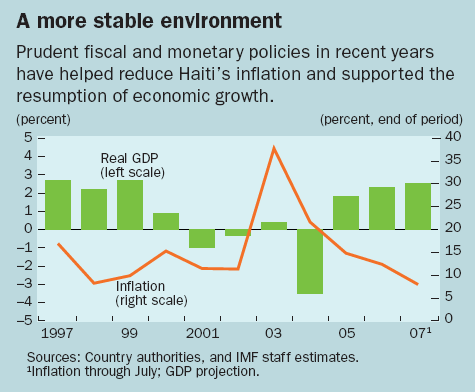
Typical street scene in Santa Ana, El Salvador. (Photo: iStock)
IMF Survey: Haiti's Economic, Political Turnaround
September 17, 2007
- Haiti nearer economic stabilization through prudent fiscal, monetary policies
- Political stability followed successful presidential, parliamentary, local polls
- Key challenges: higher, sustained growth to boost job creation, reduce poverty
Good news is coming from Haiti as the country continues its recovery from years of political unrest and economic dislocation.

Public transportation in Port-au-Prince, Haiti—where efforts to improve public sector governance helped stabilize economy (photo: Eduardo Munoz/Reuters)
POST-CONFLICT STABILIZATION
The country has made remarkable progress since 2004 toward economic stabilization through prudent fiscal and monetary policies. Inflation has declined to single digits and output growth has resumed on a per-capita basis after being on a declining trend since the late 1970s.
Political stability has also returned following successful presidential, parliamentary, and local elections, while security has improved significantly—even though it is still fragile. The key challenge going forward will be to consolidate stabilization gains and establish higher, sustained growth to boost job creation and reduce widespread poverty.
Political turmoil, rising insecurity, and economic mismanagement in the past two decades inflicted large economic and social losses on Haiti. Poverty is widespread—76 percent of the Haitian population live on less than US$2 a day—and social indicators are among the worst in the world. Moreover, institutions have weakened substantially, contributing to low tax collection, smuggling, and legal uncertainties, as well as facilitating the transformation of Haiti into a transshipment point for illegal drugs toward the United States and Europe.
Turning point
Haiti has, however, experienced a remarkable economic and political turnaround in the past few years. Under the transition government that took power in February 2004 after President Aristide's departure, economic growth resumed—albeit at a slow pace— inflation declined to 15 percent from a peak of almost 40 percent in 2003, tax collection as well as international reserves recovered, and most external arrears were cleared.

These achievements were underpinned by prudent fiscal and monetary policies, including elimination of central bank financing of budget deficits. In addition, there were significant efforts to improve governance and transparency in public sector operations. The IMF supported Haiti's stabilization efforts in the period 2004-06 with two successive annual arrangements under the Emergency Post-Conflict Assistance (EPCA) facility, while donors have mobilized over $1 billion in assistance since 2004 under an interim cooperation framework.
Economic stabilization
The new administration of President Préval, which took office in May 2006 after peaceful and fair elections, has shown a strong commitment to sound macroeconomic management, promotion of sustainable growth, and poverty reduction. The security situation has improved considerably, orderly local and municipal elections were held, and further progress toward economic stabilization has been made, as reflected by Haiti's strong performance under the program supported by the IMF's Poverty Reduction and Growth Facility (PRGF) approved last November.
Inflation has declined further, to 7.9 percent by end-July 2007, and gross international reserves have risen to more than $500 million, while the exchange rate has stabilized. In the current fiscal year (October 2006-September 2007), tax collection would reach close to 11 percent of GDP thanks to improved tax and customs administration, supporting higher domestically financed public investment.
The banking sector has showed improved performance after its orderly consolidation of three troubled banks in 2006. However, improvements in the provision of basic services have been limited—electricity blackouts remain the norm—and private sector credit has not picked up, as lending rates have remained high despite a sharp decline in the central bank's key interest rates in recent months.
Low-inflation environment, growth acceleration
At the conclusion of the 2007 Article IV consultations last July, the IMF's Executive Board considered that Haiti's short- and medium-term economic prospects are encouraging. Real GDP growth would probably reach about 3 percent this fiscal year—the third consecutive year of positive growth—and accelerate to 4 percent in the medium term, as infrastructure constraints and other bottlenecks are expected to be gradually removed. The further development of the monetary policy framework should contribute to consolidating a stable low-inflation environment.
The country's external position is expected to strengthen in the coming years owing to higher exports—the U.S. has granted preferential access to Haitian textile exports—and substantial debt relief under the Heavily Indebted Poor Countries Initiative approved last November, bilateral agreements with Paris Club members, and the Multilateral Debt Relief Initiative. Private transfers—currently equivalent to about 20 percent of GDP—from more than the 2 million Haitians living abroad would remain by far the main source of external financing in the medium term.
Despite this generally favorable outlook, considerable challenges still lie ahead. Overcoming significant and widespread structural and institutional bottlenecks to achieve higher growth and reduce poverty will be key.
Security situation
Priorities include addressing issues such as the still fragile security situation, dilapidated infrastructure, inadequate and costly basic services, poor coverage and quality of education and health services, low financial intermediation, difficult enforcement of property rights, and modernization of public enterprises. To finance higher levels of priority expenditures, additional efforts are necessary to mobilize domestic revenue, and the government must also improve its spending and implementation capacity.
The authorities are taking steps to address these challenges and improve the business climate. They have recently created a one-stop window for investors and have started the reform of the publicly owned telecommunications company.
In addition, the parliament is currently reviewing key laws to modernize the banking system and customs code, strengthen the justice system, and fight corruption. Improved coordination and continued support from donors, including through technical assistance, will remain critical to help the government achieve its goals of sustained economic growth, social development, and poverty reduction.


